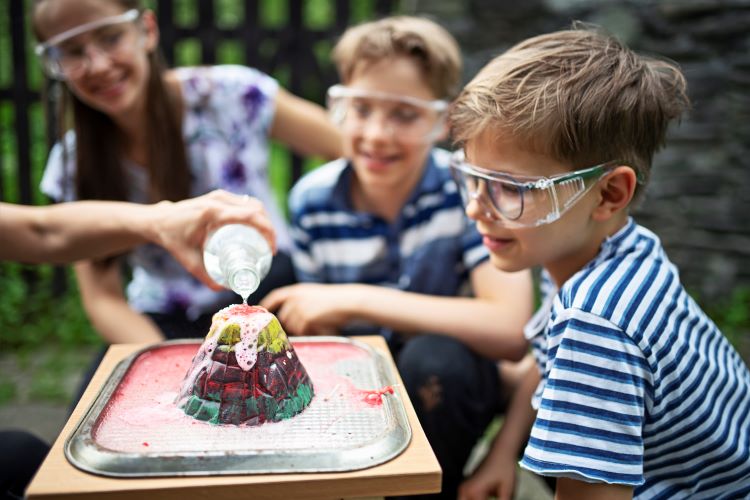Science Experiments for Kids: Science Activities for Kids


Science experiments are a great way to engage kids in the world of science and help them learn about different scientific concepts in a fun and interactive way. By conducting science experiments, children can not only learn about different scientific principles, but also develop their critical thinking, problem-solving, and observation skills.
Learning courses for your kids! Get a free trial here
Science Experiment for Kids
Here are some of the best science experiments for kids:
- Baking Soda and Vinegar Experiment: This is a classic experiment that demonstrates the reaction between an acid (vinegar) and a base (baking soda) that creates carbon dioxide gas.
- Balloon Rocket: Inflate a balloon and tie it shut. Place it on the end of a string and let it go, and watch it zoom around the room. This experiment shows the principles of air pressure and motion.
- Magic Milk: Mix milk, food coloring, and dish soap to see the colors dance and swirl on the surface. This experiment demonstrates the science of surface tension.
- Plant Growth Experiment: Plant seeds in different types of soil, or water with different amounts of sugar or fertilizer, and observe how they grow. This experiment teaches about plant growth and the importance of a plant’s environment.
- Rainbow in a Glass: Fill a clear glass with water, add a few drops of food coloring, and then carefully add a layer of oil on top. Observe how the oil and water don’t mix, creating a rainbow effect. This experiment teaches about density and the immiscibility of liquids.
- Egg in a Bottle: Place a hard-boiled egg into a bottle and light a piece of paper on fire. Quickly place the flaming paper into the bottle and watch as the heat causes the air inside the bottle to expand, forcing the egg inside. This experiment teaches about air pressure.
These are just a few examples of fun and educational science experiments that kids can do at home or in the classroom.
Also Read: Are Online Classes for kids Effective? Online Learning Platforms for kids
At Home Science Activities for Kids
Here are some fun and educational science activities for kids:
- Kitchen Science: Kids can use household items to conduct simple experiments, such as making slime with glue and borax, or creating a volcano using baking soda and vinegar.
- Build a Lemon Battery: Using a lemon, copper wire, and zinc nail, kids can build a simple battery that generates a small electric current.
- Observing the Sky: Teach kids about astronomy by stargazing at night and identifying constellations, or by observing the movement of the sun and the changing position of shadows throughout the day.
- Plant a Garden: Planting seeds and watching them grow can be a fun and educational activity for kids. They can learn about the basic needs of plants, such as light, water, and soil.
- Egg Drop Challenge: Using materials found around the house, kids can design a structure to protect an egg from breaking when dropped from a height. This activity teaches about the properties of materials and the forces of impact.
- Make a Tornado in a Bottle: Kids can create their own mini tornado by filling a bottle with water, adding some food coloring, and then spinning the bottle. This activity demonstrates the principles of fluid dynamics and the formation of tornadoes.
These are just a few examples of science activities that kids can do at home with everyday materials. By engaging in hands-on experiments, kids can develop an understanding of scientific concepts and a love of learning.
Learning courses for your kids! Get a free trial here
Wrapping it Up
Science activities for kids are incredibly beneficial for their development in a number of ways. Some of the key benefits include:
- Encouraging curiosity and problem-solving skills: Science activities often involve hands-on experimentation and exploration, which can help to develop a child’s natural curiosity and encourage them to ask questions and seek answers. This can also help to build their problem-solving skills as they work through various challenges.
- Improves critical thinking and observation skills: Science experiments and activities often require careful observation and attention to detail. This helps children to develop critical thinking skills as they learn to evaluate and analyze information.
- Enhances creativity: Science activities often involve using imagination and creativity to find new solutions to problems. This can help children to think outside the box and develop innovative and creative problem-solving skills.
- Fosters a love of learning: By engaging in hands-on science activities, children can develop a love of learning and a desire to explore and discover new things. This can help to set the foundation for a lifelong love of science and learning.
- Supports STEM education: Science activities can help to build the foundation for future studies in STEM fields (Science, Technology, Engineering, Mathematics), which are increasingly important in today’s rapidly changing technological world.
Overall, science activities for kids are a fun and engaging way to support their development and help them grow into well-rounded, curious, and creative individuals.
Also Read: Word Games for Kids: Word Puzzle Games for Kids Online
Recent Posts
What are the Advantages of Online Teaching at The Real School?
In the article -"What are the Advantages of Online Teaching at The Real School?" we…
What is the Full Form of School?: Unveiling the Acronym
The term "school" carries profound significance in the realm of education, representing more than just…
What is Math Full Form?: Cracking the Code
Mathematics, often referred to as "Math," is a subject that elicits various reactions from students…
What is Full Form of Homework?: Decoding Academics
Homework, an integral part of the academic journey, often raises questions about its purpose and…
What is Full Form of Teacher?: Demystifying Education
In the intricate tapestry of education, teachers stand as the pillars shaping the intellectual and…
What is Real Education?: Discovering Its Essence and Impact
The concept of real education is evolving, transcending traditional views that equate it solely with…


